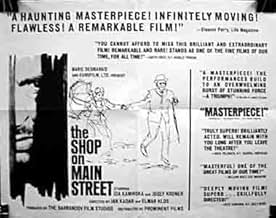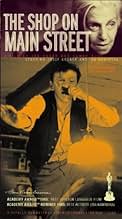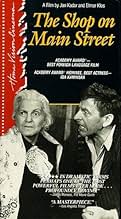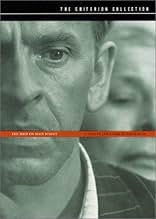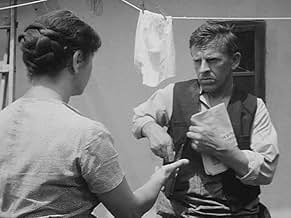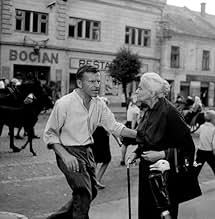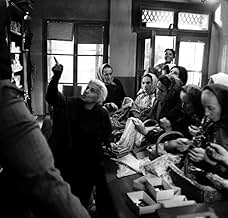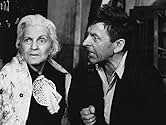NOTE IMDb
8,2/10
10 k
MA NOTE
Ajouter une intrigue dans votre langueA carpenter in the Fascist Slovak State is appointed "Aryan controller" of a Jewish widow's store.A carpenter in the Fascist Slovak State is appointed "Aryan controller" of a Jewish widow's store.A carpenter in the Fascist Slovak State is appointed "Aryan controller" of a Jewish widow's store.
- Réalisation
- Scénario
- Casting principal
- Récompensé par 1 Oscar
- 6 victoires et 4 nominations au total
Ida Kaminska
- Rozalia Lautmannová
- (as Ida Kaminská)
Frantisek Zvarík
- Markus Kolkocký
- (as Frantisek Zvarík)
Ladislav Farkas
- Young Man
- (non crédité)
Luise Grossová
- Eliasová
- (non crédité)
Juraj Herz
- Jewish Man
- (non crédité)
Avis à la une
I'll skip over the story and the themes. Other commenters have said wonderful things about that.
Let's talk visuals.
I just have to say I was blown away by almost every single shot of the movie. The black and white color looks gorgeous, and the indoor shots have lots of shadows and texture. The outdoor shots seem overexposed, brilliant, artificial and almost unbearable. The criterion version just looks superlative.
Watch the dinner scene at the start where the man's brother in law is getting drunk with Tony. They are yelling, and having a time, and the camera dives/sweeps/rapidly turns around and falls. It conveys the dizzying nature of the conversation. The outdoor scenes in the first half of the movie have lots of bustle and activity, with lots of turns and shifts of perspective. People will remember the historical themes, but please don't overlook the amazing cinematography (which rightfully doesn't call attention to itself but enhances the emotional impact of every scene). In one scene (where Person X hits Person Y), camera conveys the claustrophobic, almost paranoiac perspective of Person X and sets the rest of the action up. We just knew what was going to happen next here.
The dream sequences/surreal effects were modest and didn't seem too fantastic; they were small enough for a small man overtaken with fear.
Let's talk visuals.
I just have to say I was blown away by almost every single shot of the movie. The black and white color looks gorgeous, and the indoor shots have lots of shadows and texture. The outdoor shots seem overexposed, brilliant, artificial and almost unbearable. The criterion version just looks superlative.
Watch the dinner scene at the start where the man's brother in law is getting drunk with Tony. They are yelling, and having a time, and the camera dives/sweeps/rapidly turns around and falls. It conveys the dizzying nature of the conversation. The outdoor scenes in the first half of the movie have lots of bustle and activity, with lots of turns and shifts of perspective. People will remember the historical themes, but please don't overlook the amazing cinematography (which rightfully doesn't call attention to itself but enhances the emotional impact of every scene). In one scene (where Person X hits Person Y), camera conveys the claustrophobic, almost paranoiac perspective of Person X and sets the rest of the action up. We just knew what was going to happen next here.
The dream sequences/surreal effects were modest and didn't seem too fantastic; they were small enough for a small man overtaken with fear.
10Buddy-51
The last half hour of this film may well be the most emotionally intense examination of a personal moral crisis ever put on film.
The movie achieves that rarest feat of being able to portray one of the most horrendous experiences in human history without resorting to sensationalism or sentimentality.
The acting of Josef Kroner and Ida Kaminska is without peer and the musical score is quite simply haunting and adds immeasureably to the film's overall effectiveness.
Make every effort to see this true cinematic masterpiece.
The movie achieves that rarest feat of being able to portray one of the most horrendous experiences in human history without resorting to sensationalism or sentimentality.
The acting of Josef Kroner and Ida Kaminska is without peer and the musical score is quite simply haunting and adds immeasureably to the film's overall effectiveness.
Make every effort to see this true cinematic masterpiece.
Words can hardly do justice to this gem. Understated cinematic grandeur, ultimate moral subtlety, acting without pair in the annals of movie history, philosophical and ethical depth without sententiousness . . . should I invent new superlatives to describe this indescribably touching movie?
Yes, the movie has to do with the tragedy of Jewish people in the poisoned and poisonous Europe of the WWII period, but the emotional implications go much farther than that. They address human condition in general. It is one of those egregiously few movies which make a "philosopher" out of each of us. . . even if for a minute only. . . even if we only philosophize with our unstoppable tears. I am not one to weep easily at movies, but I defy you to watch this fabulous work of cinema without being touched to the deepest fiber of your soul.
Yes, it is that good. One of the very few movies which are better than GREAT MUSIC. Watch it - preferably on the Criterion DVD, the VHS edition leaves a lot to be desired. Unless you are an unfeeling freak, no offense intended, it is very unlikely that you will ever regret it.
Yes, the movie has to do with the tragedy of Jewish people in the poisoned and poisonous Europe of the WWII period, but the emotional implications go much farther than that. They address human condition in general. It is one of those egregiously few movies which make a "philosopher" out of each of us. . . even if for a minute only. . . even if we only philosophize with our unstoppable tears. I am not one to weep easily at movies, but I defy you to watch this fabulous work of cinema without being touched to the deepest fiber of your soul.
Yes, it is that good. One of the very few movies which are better than GREAT MUSIC. Watch it - preferably on the Criterion DVD, the VHS edition leaves a lot to be desired. Unless you are an unfeeling freak, no offense intended, it is very unlikely that you will ever regret it.
In 1942, in a small town in Czechoslovakia, the poor carpenter Tony Brtko is assigned "Aryanizator" of a small shop on the main street by his fascist brother-in-law Mark Kolkotsky. His greedy wife Evelyn is seduced with the promise of fortune, but Tony finds that the store owned by the deaf and senile seventy eight year-old widow Rozalie Lautmann is bankrupted and the old lady is financially supported by the Jewish community that promises a salary to him to help her.
I have come to feel that the Czech film of the 1960s may be one of the best places and best decades in the history of film. The "new wave" there is far more interesting than anything that came out of France or Italy, and was a decade ahead of the United States.
This film manages to be a serious examination of an ethical conflict but still has a hint of humor and gaiety. Not enough to be offensive or dismissive of the subject matter, but just enough to remind us of the glorious Czech new wave.
I have come to feel that the Czech film of the 1960s may be one of the best places and best decades in the history of film. The "new wave" there is far more interesting than anything that came out of France or Italy, and was a decade ahead of the United States.
This film manages to be a serious examination of an ethical conflict but still has a hint of humor and gaiety. Not enough to be offensive or dismissive of the subject matter, but just enough to remind us of the glorious Czech new wave.
Objective aethetics can sometimes require background information in order to properly judge a piece of art. In the case of this film, it is essential to realize that the film was made under heavy communist censorship. Thus we have plenty of anti-fascist rhetoric as well as the heroic rebel character who abound in Marxist cinema. Yet behind this facade is a devastating critique of the ideology of terror which is the foundation of not only fascism, but the communism of 1960's Eastern Europe.
There's a whole tradition of political film forced to obscure themes enough to slide them past superficial censors and into the minds of a sometimes discerning audience. It can be done by simply universalizing the themes and parallelling the setting with something the audience could recognize. But Chaplin had explored a different method with The Great Dictator, by finding the similarities between two seemingly opposite figures. Through his critique of Hitler, he took on American pomposity and brutality. It is a particularly effective method as it allows the target no way out, turning its own accusations against itself.
Much has been said about the comedy and tragedy's coexistence in this film, and it is indeed an important facet. The simple reason being that life is both funny and tragic, thus to universalize the themes so that any person can be in the Brtko's place, it is imperative to represent both spheres of life.
But the theme is not limited to a broad contemplation on life in the universal sense. There is a much more devestating critique of all totalitarian ideologies. Brtko begins with a simple and, one could argue, natural sense of survival. He is pushed into greed by his wife, and is then pushed into desperation by the his state-sanctioned duty. He finally arrives into a complete state of terror caused by the irrationality of the events around him, and heightened by his relationship with Mrs. Lautmann. Of course, this kind of degradation could happen just as easily under a communist regime as in the days of the Nazis, and this was what the censors missed and the Academy Awards loved.
Few films have the social significance of this one. Not only for its powerful message, but the fact that it is a glimpse into a world we know little about.
5 out of 5 - Essential
There's a whole tradition of political film forced to obscure themes enough to slide them past superficial censors and into the minds of a sometimes discerning audience. It can be done by simply universalizing the themes and parallelling the setting with something the audience could recognize. But Chaplin had explored a different method with The Great Dictator, by finding the similarities between two seemingly opposite figures. Through his critique of Hitler, he took on American pomposity and brutality. It is a particularly effective method as it allows the target no way out, turning its own accusations against itself.
Much has been said about the comedy and tragedy's coexistence in this film, and it is indeed an important facet. The simple reason being that life is both funny and tragic, thus to universalize the themes so that any person can be in the Brtko's place, it is imperative to represent both spheres of life.
But the theme is not limited to a broad contemplation on life in the universal sense. There is a much more devestating critique of all totalitarian ideologies. Brtko begins with a simple and, one could argue, natural sense of survival. He is pushed into greed by his wife, and is then pushed into desperation by the his state-sanctioned duty. He finally arrives into a complete state of terror caused by the irrationality of the events around him, and heightened by his relationship with Mrs. Lautmann. Of course, this kind of degradation could happen just as easily under a communist regime as in the days of the Nazis, and this was what the censors missed and the Academy Awards loved.
Few films have the social significance of this one. Not only for its powerful message, but the fact that it is a glimpse into a world we know little about.
5 out of 5 - Essential
Le saviez-vous
- AnecdotesThis movie was shot exclusively in the small Slovak city of Sabinov.
- GaffesSet in 1942, a German troop train moves through the town. The train is carrying Soviet cold-war era trucks and anti aircraft guns that didn't exist until the 1950s. It's understandable for them to make this substitution since any authentic German equipment would have been scrapped long before.
- Citations
Jozef Katz: I don't understand anything any more. But I know one thing. When the law persecutes the innocent, that's the end of it. And those who make the law, too.
- ConnexionsEdited into CzechMate: In Search of Jirí Menzel (2018)
- Bandes originalesÉn vagyok a falu rossza egyedül
(uncredited)
Written by Lajos Békésy, Imre Garsi and László Patak
Performed by Jozef Kroner, Frantisek Zvarík, Hana Slivková and Elena Zvaríková
Meilleurs choix
Connectez-vous pour évaluer et suivre la liste de favoris afin de recevoir des recommandations personnalisées
Détails
- Durée2 heures 8 minutes
- Couleur
- Mixage
- Rapport de forme
- 1.37 : 1
Contribuer à cette page
Suggérer une modification ou ajouter du contenu manquant


